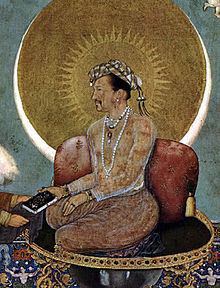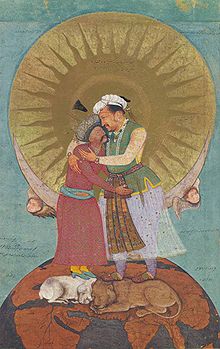Jahangir
![]()
The title of this article is ambiguous. For the Bangladeshi judoka, see Alam Jahangir; for the Pakistani lawyer and human rights activist, see Asma Jilani Jahangir. For the Iranian journalist and editor, see Mirzā Jahāngir Chān.
Jahangir (German also: Dschahangir, Persian جهانگیر, DMG Ğahāngīr, 'world conqueror'; full name: Nūruddīn Shāh Jahāngīr Pādshāh Ghāzī; b. 31 August 1569 in Fatehpur Sikri; d. 28 Oct. Jul. / 7 Nov. 1627greg. in Khanpur Chingas / Kashmir, en route to Lahore) is the name given to Akbar's son Salīm as ruler of the Mughal Empire. He ruled between 1605 and his death in 1627; his mother was the Hindu princess Mariam uz-Zamani, who had died only four years earlier.
To come to power, he fought both his father and his own brother, Prince Parviz. In the course of the power struggle, he assassinated the minister Abu 'l-Fazl and was already mounting a campaign against the city of Agra before he was stopped from doing so by the mediation of the women of the family. Reprimanded several times by his father, Jahangir had to reckon with the opposition of his own eldest son Khusrau even during Akbar's lifetime. The latter attempted to conquer Lahore as early as 1607, but was captured and - after another conspiracy - blinded and handed over to his brother Prince Khurram, later the Great Mogul Shah Jahan, for supervision.

Jahangir, detail from a painting by Bichitr, c. 1620

Jahangir (r.) and Shah Abbas I of Persia (painting by Abu al-Hasan, c. 1620)
Live
Like his father, Jahangir was characterized by a more scientific curiosity, passionately promoted painting and continued Akbar's liberal religious policy. However, he was also addicted to alcohol and opium, and also suffered from asthma, so that the government slipped away from him as he grew older. Though he reduced his consumption of alcohol from 20 cups of double brandy to 6 cups of wine and 14 grains of opium a day, his health was poor. He combined in himself many opposites, was considered as cruel as he was affectionate, and as capricious as he was just.
As ruler, he tried to continue and even surpass Akbar's policies, but because of his illness, he left much of the business of government to his confidants. During his reign, the treasury emptied; at the same time, corruption and administrative expenses increased enormously. Jahangir's reign saw the pacification of the Rajputs in 1614. Jahangir (himself son of the Rajput princess of Amber) heeded the pride of the Rajputs: no reigning Rana of Udaipur (Mewar) ever appeared in the Mughal court, nor did any princess of Mewar enter the Mughal harem. The son of Amar Singh (r. 1597-1620), Karan Singh, on the other hand, went in and out of the court and was kindly received.
On May 25, 1611, Jahangir married Mehr-un-Nisa, later known as Nur Jahan (also Nur Mahal), in her 20th (and last) marriage, and she soon exerted considerable influence on politics. Her father Itimad-ud-Daulah († 1622) became grand vizier. Thereafter, her brother Asaf Khan became the most influential person at court, and her niece Mumtaz Mahal became the wife of Prince Khurram, later the Great Mogul Shah Jahan. With Nur Jahan, the Persian grouping, the Iranis, also prevailed at court against Hindustanis and Turanis; this caused an influx of scholars, artists, and soldiers from Persia.
In the years after 1622, Jahangir's third son Prince Khurram (later Shah Jahan) was in permanent but only half-hearted rebellion, having been outplayed at court by Nur Jahan, and was to embark on a campaign against Persia, which he refused to do in view of the unfavourable situation at court. In 1626, a general named Mahabat Khan tried to take over Asaf Khan's position at court. He seized the emperor's person, but allowed Nur Jahan to accompany him. Soon she wrested his own troops from him, so that he himself had to flee to Shah Jahan.
After Jahangir's death on 28 October 1627, Asaf Khan eliminated his rival on behalf of Shah Jahan and banished his sister Nur Jahan - financially well off - to Lahore, where she devoted herself to building the tomb for her husband (Jahangir Mausoleum).
Memoirs
Jahangir described his reign in his memoirs, the Tūzuk-i Jahāngīrī (later also called Jahāngīrnāma) itself. The memoirs are arranged chronologically and have a very personal feel, often resembling a diary. Besides the usual occupations of an emperor, such as promotions, receiving ambassadors, and hunting, they contain much about curiosities, cities and countries, plants and animals, whatever interested the emperor. Especially as an amateur zoologist, Jahangir was definitely at the top of his game. After his 17th year of reign, Jahangir was too ill to continue his Tūzuk himself, and entrusted the task to a chronicler.
Search within the encyclopedia